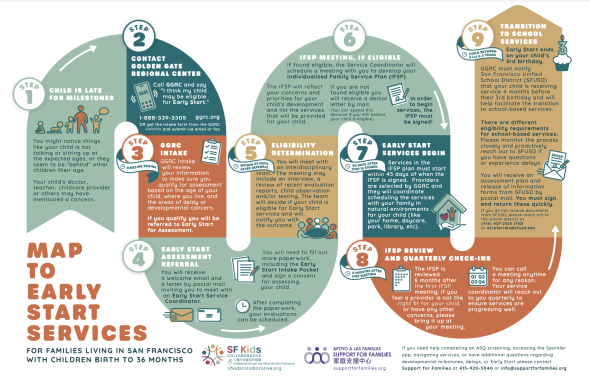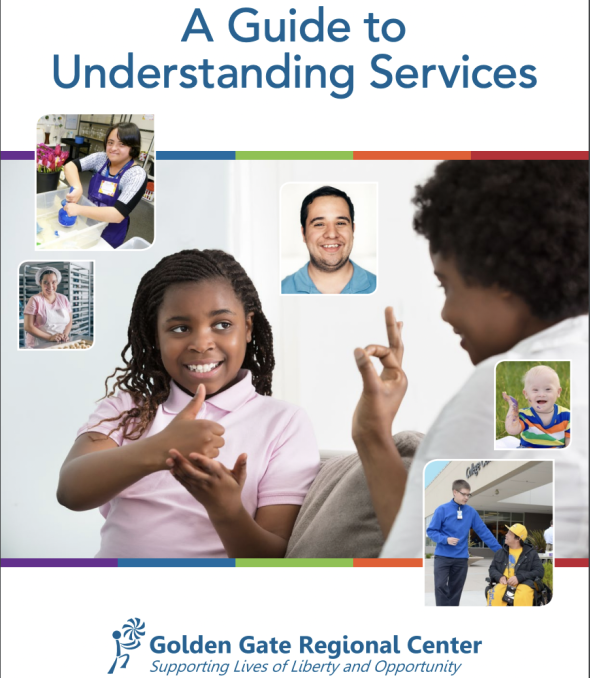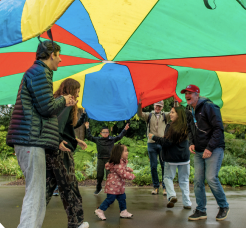Resources
Link to this section

Entering and Exiting Early Start Services
Early Start is the program in California that provides this support for infants and toddlers with developmental concerns. Children grow and develop in truly remarkable ways from birth to age 5.
Support for Families and the SF Kids Collaborative have created a map to show you how to access Early Start services for your child.

Golden Gate Regional Center Resources
Golden Gate Regional Center (GGRC) provides services and supports to individuals with developmental disabilities in Marin, San Francisco and San Mateo counties. Visit ggrc.org for more information about eligibility and how to apply for services.
- A Guide to Understanding Services
- What to expect leaving Early Start (Lanterman Assessment)

Your Role in Your Child’s Early Intervention Team
This resource was developed to support families in the early intervention process by providing general information regarding IFSP teams, what to expect and how to prepare for IFSP meetings, communicating with service providers, and advocating for the child.
Early Childhood Special Education Link to this section
ECSE Continuum of Services | Español | 中文 | Tiếng Việt | عربي | Tagalog | русский
It is the responsibility of public school districts to provide eligible students with disabilities a free and appropriate public education (FAPE) in the least restrictive environment (LRE) based on the individual needs of the student. Children identified with a disability that adversely effects their education are eligible for special education services through an Individual Education Program (IEP). The IEP is developed by a team that includes the parent/guardian, SFUSD evaluators, other professionals working with the child, current teacher, translator as needed and any other representatives the family or district feels would be supportive in developing the program.
Early Childhood Special Education Assessment Unit
If you would like to request a special education assessment of your child please review the Early Childhood Special Education (ECSE) Preschool Intake Packet | Español | 中文 | Tiếng Việt. The Intake Packet includes a questionnaire and required documents that should be completed to help SFUSD assessors get to know your child, accurately address your concerns, and determine any assessment needs.
Phone: (415) 401-2525 x1101
Email: ecreferrals@sfusd.edu
Fax: (415) 920-5075
Assessment Unit Hours of Operation:
Monday through Friday 8:00 AM to 4:00 PM
Office Hours are 8:00am - 4:30am.
Location of Services
As the Early Education Department and Special Education Services continue to collaborate to jointly meet the unique needs of our students, changes in the location and type of services may change. The list below represents sites with Early Childhood Special Educators on staff. Please visit Early Education’s website for a comprehensive list of Early Education sites: www.sfusd.edu/schools/our-schools/early-education-school-sites. You can also view the information on this page in this downloadable pdf.
|
|
|
|
|
|
|
|
|
|
|
|
|
|
|
|
|
|
|
|
|
|
|
|
|
|
|
|
|
|
|
|
|
|
|
|
|
|
|
|
|
|
|
|
|
|
|
|
|
|
|
|
|
|
|
|
|
|
|
|
|
|
|
|
|
|
|
|
|
|
|
|
|
|
|
|
|
|
|
|
|
|
|
|
|
|
|
|
|
|
|
|
|
|
|
|
Key:
EED – Early Education Site T/C DHH – Total Communication approach for students who are Deaf/Hard of Hearing
INT – Integrated(Inclusion) A/O DHH– Auditory Oral approach for students who are Deaf/Hard of Hearing
SDC – Special Day Class
Early Childhood Special Education Settings
Link to this section
The following descriptions describe service delivery options available in Early Childhood Special Education settings to assist in the IEP development.
Related Services
Related Services are designed to address specific, specialized interventions when necessary for a student to benefit from their environment. A credentialed or licensed specialist provides services. These services may include: speech and language therapy, physical therapy, occupational therapy, vision services, orientation and mobility, nursing, audiology services and behavior intervention services.
Preschool Language Center
Speech and Language Specialists provide therapy to eligible preschool children, generally in small groups housed in SFUSD school sites.
Itinerant Early Childhood Special Education Services
Early Childhood Special Education teachers provide a continuum of services to students in their natural environment. Services can include consultation to family and staff as well as direct support to the child. The goal of these services is to ensure goal progress, access to curriculum/typical peers and maintaining the child’s current environment.
Integrated General Education Class (INT)
Early Childhood Special Education teachers monitor and provide support with IEP goals in a SFUSD General Education setting with typically developing peers. This program is 4 hours, 5 days per week.
Special Day Class (SDC)
Early Childhood Special Education teachers provide intensive instruction with a small teacher to student ratio to support goal progress and peer engagement. This program is 4 hours, 5 days per week.
Early Childhood Special Education Resources for Families Link to this section
Resources Link to this section
Golden Gate Regional Center provides services and supports to individuals with developmental disabilities in Marin, San Francisco and San Mateo counties. Visit ggrc.org for more information about eligibility and how to apply for services.
- A Guide to Understanding Services
- What to expect leaving Early Start (Lanterman Assessment)
California's Early Start Program
The Early Start program is California's early intervention program for infants and toddlers with disabilities and their families. Early Start services are available statewide and are provided in a coordinated, family-centered system. For more information regarding Early Start services and referrals, please contact the Early Start BabyLine at 800 – 515 – BABY (800 – 515 – 2229) or earlystart@dds.ca.gov.
The CDE's EED launched a web page dedicated to resources to support the field of early education professional and families of children with disabilities to increase identification, access, participation and supports of children with disabilities in early care and education programs. The web page will soon include a matrix and additional resources will continually be added at https://www.cde.ca.gov/sp/cd/op/ieeresources.asp.
CDE’s EED’s Dual Language Learner (DLL) Support Web Page is Now Available
The EED has created a dual language learner (DLL) support web page. This web page provides technical support, guidance, and resources for the identification, reporting, and support of dual language learners in California State Preschool Programs. We are excited to provide this web page for easy access and reference to resources and supports.
The DLL Support Webinar Series recordings and PowerPoint presentations, as well as other support materials for the field will soon be posted on this web page. We will continue to update and add additional resources and support materials in the future. You may access the DLL Support web page at https://www.cde.ca.gov/sp/cd/ci/dllsupport.asp.
Check out our collection of special education articles for more information about the special education process, what to expect at your first meeting, questions to ask during the meeting, the difference between a medical and an educational evaluation and more.
Since 1982, Support for Families of Children with Disabilities has offered information, education, and parent-to-parent support free of charge to families of children with any kind of disability or special healthcare need and to the professionals who work with them in San Francisco.
Sesame Street Autism: Resources for Parents
Use these videos, activities, and topics to help you see amazing in all children.
Hand in Hand Parenting helps parents when parenting gets hard. Our parenting approach builds resilient families and supportive communities of parents and professionals.
This page was last updated on May 1, 2025

